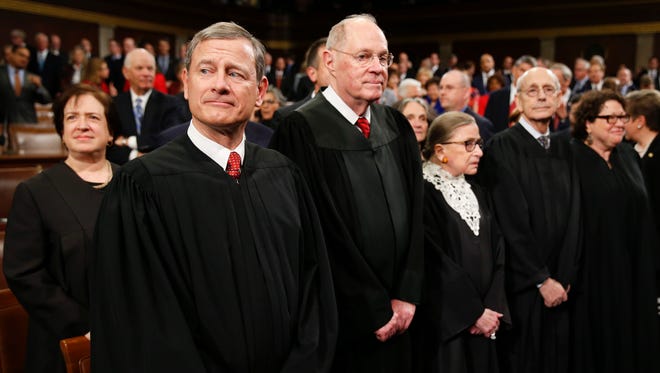It's unanimous: Supreme Court playing small ball
WASHINGTON — Divided down the middle by ideology and the political party of the presidents who nominated them, the justices of the Supreme Court nonetheless have kicked off their 2016 term with five unanimous rulings.

That's not surprising; the early decisions usually are the least controversial. Just three years ago, the same slate of justices along with Justice Antonin Scalia, who died in February, began the 2013 term with a string of 9-0 opinions.
But this year's cases are striking for another reason: In each case, the justices decided less than they could have — a display of judicial minimalism that wins applause from across the political spectrum but leaves often important questions unresolved.
Working shorthanded since Scalia's death and destined to do so until the Senate confirms a ninth justice of President-elect Donald Trump's choosing, the court has delayed oral arguments in some of its toughest cases, such as a church-state conflict and a government seizure of private property.
Meanwhile, it has decided two of the more interesting cases on its shrinking docket — involving insider trading and a patent dispute between smartphone makers Apple and Samsung — as well as three others by ruling narrowly.
"That's a great thing. That's how it should be all the time," says Eric Segall, a law professor at Georgia State University College of Law who has written on the need for judicial restraint. "I think America is better off when the court does less."
The progressive Segall could have been quoting the conservative leader of the high court, Chief Justice John Roberts. Near the end of his first term in 2006, Roberts said, "If it is not necessary to decide more ... then in my view, it is necessary not to decide more."
Justice Sonia Sotomayor followed that advice in her concise, nine-page unanimous opinion that only partially resolved a multimillion-dollar dispute between Samsung and Apple. The court ruled that Samsung's violations of Apple's design patents could involve individual components, rather than the entire phones, then sent the case back to a lower court to decide.
Read more:
Samsung wins Supreme Court fight with Apple
Supreme Court sets tough insider trading rule
Similarly, Justice Samuel Alito declined to write a court-ordered definition for insider trading in his unanimous ruling that tips passed between relatives and friends are illegal, even when the corporate insider receives no direct financial benefit. The ruling clarified an earlier Supreme Court precedent but went no further.
"It remains the case that 'determining whether an insider personally benefits from a particular disclosure, a question of fact, will not always be easy for courts,' " Alito said, quoting from that earlier decision. "But there is no need for us to address those difficult cases today."
The three other unanimous decisions also left broader issues unresolved.
In the first case decided this term, Justice Ruth Bader Ginsburg said a defendant acquitted on some charges and convicted on others can be retried even if a conviction was later vacated because the jury was improperly instructed. She did not address one of the arguments made by Lisa Blatt, the attorney for the defendants, that the government's use of overlapping charges "skyrockets the conviction rate."
In another case, Justice Stephen Breyer ruled against a defendant convicted of bank fraud who argued that he stole from a depositor, not the bank itself. But Breyer left open the possibility that the jury was improperly instructed and sent the case back to a federal appeals court to decide that issue.
And in a False Claims Act complaint against State Farm Fire & Casualty Co. for miscasting wind damage as flood damage and shifting liability to the government, Justice Anthony Kennedy upheld a district court's refusal to dismiss the case over improper publicity. But he said the lower court also might have ruled the other way.
"That possibility, however, need not be considered here," Kennedy said. "In general, the question whether dismissal is appropriate should be left to the sound discretion of the district court."